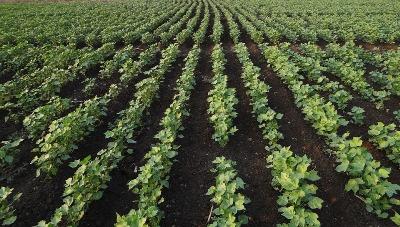MUMBAI, 11 September 2017 : An all-out multi-level campaign has been launched on a war footing on the dreaded pink boll worm attack that has been causing a havoc to Bt cotton crop across India.
Over the years, pink boll worm (PBW) has developed resistance to Bt cotton and during the last cotton season alone the pest has caused a crop loss ranging from 20% to 25% across the states. Some farmers even lost the entire crop as it had to be uprooted due to severe damage. This year, the loss could even go up, which could lead to major agrarian crisis, if timely checks are not implemented, experts have said.
To overcome this problem, the union government has recommended a unique RIB concept (Refugia In Bag) wherein 25 grams of non-Bt Cotton seed is mixed with 450 grams of Bt Cotton seeds. This new RIB system make farmers plant non-Bt plants compulsorily as seeds are mixed inside bag. Such non-Bt plants can host PBW wild insects (which are not resistant to Bt ) and prevent resistance buildup in PBW by mating with mutant insects ( which have developed resistance ) whose progeny again lose the resistance.
Earlier, farmers in general have ignored this process due to lack of awareness and fell victim to pink bollworm attack. During the current season, however, the National Seeds Association (NSAI) has taken up the issue on a war footing and revived the RIB concept.
“The field staff of various seed companies has been working proactively working with the farmers to impress upon them on the need to go for RIB and save their main crop,” said National Seeds Association of India (NSAI) president P Prabhakar Rao, who is also the Chairman and Managing Director of Nuziveedu Seeds Limited, the largest cotton seed company in the country.
“We are also working very closely with several state agricultural universities who too have come to the aid of farmers and we are happy that the efforts have begun to yield positive results,” Mr Rao said and explained: “This is part of our multi-pronged campaign - #SecureFarmer2SecureIndia – and we have made a beginning with cotton.”
“Compared to last year, the awareness levels are higher now and farmers are managing this problem much better. They are using pheromones traps to detect the presence of pink boll worms early in the season, to take timely remedial action by spraying required agrochemicals as preventive action,” said NSAI general secretary and seed technologist ASN Reddy.
Several seed and pesticide companies have also begun to distribute pheromone traps as part of their CSR projects. More than 100,000 traps have already been pressed into action both by public and private sector establishments as a measure for awareness drive for early detection of PBW attack, NSAI said.
NSAI has also represented to the Union Agriculture Ministry to popularize an Integrated Pest Management (IPM) programme which involves crop rotation of Cotton with other crops, biological control of insects with the help of insects and parasites that devour pink boll worms and destroying of crop residue and trash in the field.
Explaining the importance of IPM, Mr N M Sharma, managing director of Gujarat Cotton Cooperative Federation, said the pupa of PBW which is a monophagous pest that feeds only on Cotton, has a tendency, where its pupa intelligently hides underground during winters and then emerges out to attack Cotton crop with vengeance.
Per government statistics, cotton is grown between 10.5 million to 12.5 million hectares (or 25-30 million acres) across 11 major growing states of Maharashtra, Gujarat, Telangana, Andhra Pradesh, Karnataka, Punjab, Haryana, Madhya Pradesh, Rajasthan, Odisha and Tami Nadu. In peak years like the current period, it may touch 12 mha.
Mr S S Bainade, former professor at Marathwada Agriculture University, described the pink boll worm problem as “quite serious” in almost all districts in the region. “The problem occurs during dry spells and when we do not receive adequate rains,” he said and pointed out that the insects have been noticed over past couple of months.
Boll worms are still the most dangerous pests of cotton, as they thrive on boll or fruit of cotton which contains Kapas or fibre, thereby causing severe economic damage, said Dr S B Patil, Professor in Department of agricultural entomology, University of Agricultural Sciences, Dharwad.
Entomologist B Rosaiah, former associate director of research at N G Ranga Agriculture University, Guntur, Andhra Pradesh, said the pest is a problem in all the cotton growing countries and in India its attack is proven to be severe in late sown cotton crop -in July and harvested in November-December.




















